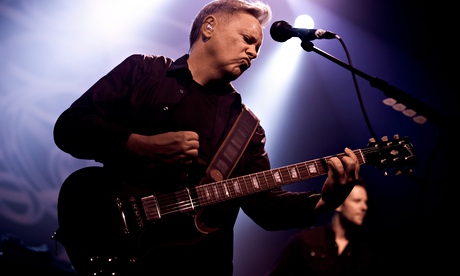
In June 1976 the Sex Pistols played a sparsely attended gig at Manchester’s Lesser Free Trade Hall. The night has gone down in history, not for the music played, but for the creativity it inspired in certain audience members. This creativity continues to reverberate into the 21st century – though nowadays it is more likely to appear on paper than on vinyl.
Thus recent years have seen the publication of Morrissey’s Autobiography, Mark E Smith’s Renegade, and Peter Hook’s Unknown Pleasures; there are rumours of forthcoming memoirs from Johnny Marr, Stephen Morris, Peter Hook (again: this time concentrating solely on New Order) and, perhaps most intriguingly, Brix Smith Start, ex-wife of Mark E Smith.
This month alone has seen the publication of Steve Hanley’s The Big Midweek, a warm and generous recollection of his 20 years as bass player in the Fall, and Bernard Sumner’s Chapter and Verse, an eminently readable and (mostly) amiable account of Joy Division and New Order.
And while the literary merits of this sub-genre can be a little patchy (the best of the bunch being Morrissey’s, Hanley’s and Sumner’s), taken collectively, flaws and all, they make for extremely interesting bedfellows. Anecdotes overlap; histories intertwine; careers rub up against each other before flouncing off in wildly divergent directions. Hanley recounts 1987’s Festival of the Tenth Summer, organised by Factory Records to celebrate the anniversary of the Sex Pistols gig, and wryly comments upon the line-up:
“It’s always been New Order, the Smiths and the Fall. Or the Smiths, New Order and the Fall. It was only ever the Fall and the Smiths for one nanosecond during that first gig when they supported us at the Electric Ballroom. A year later they were massive.”
The multiple perspectives on similar events contribute greatly to the books’ appeal. It also helps that the three bands in question are three of the finest and most original this country has ever produced, and that their stories possess all the ingredients of over-the-top potboilers. They abound with ambition and hubris; loyalty and betrayal; larger-than-life characters with larger-than-life appetites and excesses; and, most importantly, there are the flashes of life-changing genius that lie at the heart of each group.
But are they merely another product of our retro-obsessed society, something to be filed alongside the deluxe-edition box-set and the anniversary tour programme? Or is it that one memoir begets another? (For example, is it likely that Johnny Marr would be penning his own autobiography had not a certain Penguin Classic proved such a runaway success?) The age of the authors may also be an important factor. At the London launch for The Big Midweek, Hanley claimed, not unreasonably, that it took over a decade before he felt ready to address his time in the Fall. (Indeed, Mark E Smith’s jokes in Renegade about setting up a “post-Fall therapy hour”, likening ex-members to Vietnam vets, whose “senses have been obliterated”.)
Meanwhile, in Chapter and Verse, Bernard Sumner claims that so far his “silence regarding anything outside the bands and the music has allowed myths to permeate and untruths to become accepted as fact, so I hope that, along the way, I can correct a few misperceptions and lay to rest as many of those myths as possible”. To the cynical reader, this may be nothing more than a pre-emptive strike against any contradictory versions of events (a Waterstones window full of £20 hardbacks is always going to carry more weight than a drunken tweet or an ill-tempered interview on XFM). But those myths and untruths are part and parcel of a band’s identity – part of their very attraction, in fact. And, as much-cherished myths are debunked and inter-band bickering is publically conducted via the written word, so the image of the band is in danger of becoming irrevocably debased. Perhaps it is for the best, then, that Sumner seems to lose interest about halfway through Chapter and Verse – which, given the recalcitrance of his public persona, is endearingly apt.
And yet us fans are suckers for a good tell-all (or even a mediocre half-tell). And I know that until this particular publishing bubble bursts, I shall keep on reading indiscriminately, shaking my head and tutting on occasion, keeping in mind the half-arsed mea culpa in Mark E Smith’s memoir: “If I was to go round and apologise for everything I’ve ever done I wouldn’t have any days left in me. And the Fall would be non-existent. And whose version of the truth rings loudest? It’s hard to get at. You only remember what you want to remember.”

